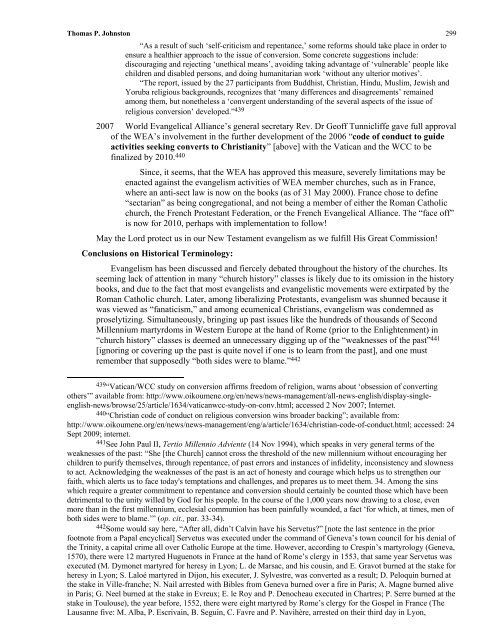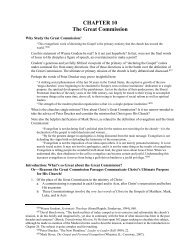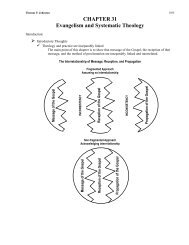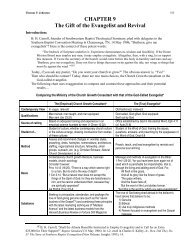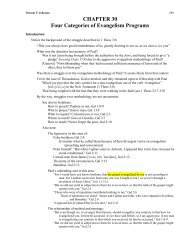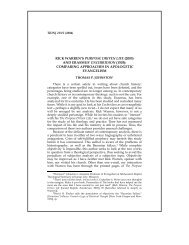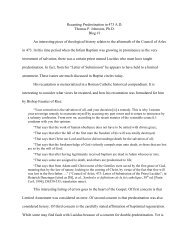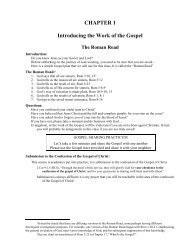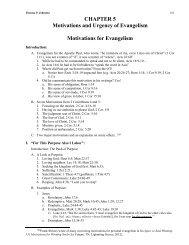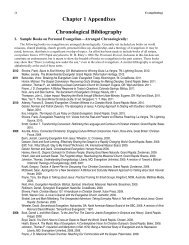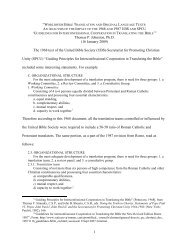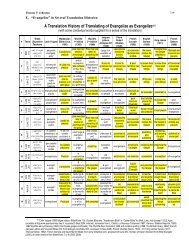CHAPTER 7 Defining Evangelizing - Evangelism Unlimited
CHAPTER 7 Defining Evangelizing - Evangelism Unlimited
CHAPTER 7 Defining Evangelizing - Evangelism Unlimited
Create successful ePaper yourself
Turn your PDF publications into a flip-book with our unique Google optimized e-Paper software.
Thomas P. Johnston 299<br />
“As a result of such ‘self-criticism and repentance,’ some reforms should take place in order to<br />
ensure a healthier approach to the issue of conversion. Some concrete suggestions include:<br />
discouraging and rejecting ‘unethical means’, avoiding taking advantage of ‘vulnerable’ people like<br />
children and disabled persons, and doing humanitarian work ‘without any ulterior motives’.<br />
“The report, issued by the 27 participants from Buddhist, Christian, Hindu, Muslim, Jewish and<br />
Yoruba religious backgrounds, recognizes that ‘many differences and disagreements’ remained<br />
among them, but nonetheless a ‘convergent understanding of the several aspects of the issue of<br />
religious conversion’ developed.” 439<br />
2007 World Evangelical Alliance’s general secretary Rev. Dr Geoff Tunnicliffe gave full approval<br />
of the WEA’s involvement in the further development of the 2006 “code of conduct to guide<br />
activities seeking converts to Christianity” [above] with the Vatican and the WCC to be<br />
finalized by 2010. 440<br />
Since, it seems, that the WEA has approved this measure, severely limitations may be<br />
enacted against the evangelism activities of WEA member churches, such as in France,<br />
where an anti-sect law is now on the books (as of 31 May 2000). France chose to define<br />
“sectarian” as being congregational, and not being a member of either the Roman Catholic<br />
church, the French Protestant Federation, or the French Evangelical Alliance. The “face off”<br />
is now for 2010, perhaps with implementation to follow!<br />
May the Lord protect us in our New Testament evangelism as we fulfill His Great Commission!<br />
Conclusions on Historical Terminology:<br />
<strong>Evangelism</strong> has been discussed and fiercely debated throughout the history of the churches. Its<br />
seeming lack of attention in many “church history” classes is likely due to its omission in the history<br />
books, and due to the fact that most evangelists and evangelistic movements were extirpated by the<br />
Roman Catholic church. Later, among liberalizing Protestants, evangelism was shunned because it<br />
was viewed as “fanaticism,” and among ecumenical Christians, evangelism was condemned as<br />
proselytizing. Simultaneously, bringing up past issues like the hundreds of thousands of Second<br />
Millennium martyrdoms in Western Europe at the hand of Rome (prior to the Enlightenment) in<br />
“church history” classes is deemed an unnecessary digging up of the “weaknesses of the past” 441<br />
[ignoring or covering up the past is quite novel if one is to learn from the past], and one must<br />
remember that supposedly “both sides were to blame.” 442<br />
439 “Vatican/WCC study on conversion affirms freedom of religion, warns about ‘obsession of converting<br />
others’” available from: http://www.oikoumene.org/en/news/news-management/all-news-english/display-singleenglish-news/browse/25/article/1634/vaticanwcc-study-on-conv.html;<br />
accessed 2 Nov 2007; Internet.<br />
440 “Christian code of conduct on religious conversion wins broader backing”; available from:<br />
http://www.oikoumene.org/en/news/news-management/eng/a/article/1634/christian-code-of-conduct.html; accessed: 24<br />
Sept 2009; internet.<br />
441 See John Paul II, Tertio Millennio Adviente (14 Nov 1994), which speaks in very general terms of the<br />
weaknesses of the past: “She [the Church] cannot cross the threshold of the new millennium without encouraging her<br />
children to purify themselves, through repentance, of past errors and instances of infidelity, inconsistency and slowness<br />
to act. Acknowledging the weaknesses of the past is an act of honesty and courage which helps us to strengthen our<br />
faith, which alerts us to face today's temptations and challenges, and prepares us to meet them. 34. Among the sins<br />
which require a greater commitment to repentance and conversion should certainly be counted those which have been<br />
detrimental to the unity willed by God for his people. In the course of the 1,000 years now drawing to a close, even<br />
more than in the first millennium, ecclesial communion has been painfully wounded, a fact ‘for which, at times, men of<br />
both sides were to blame.’” (op. cit., par. 33-34).<br />
442 Some would say here, “After all, didn’t Calvin have his Servetus?” [note the last sentence in the prior<br />
footnote from a Papal encyclical] Servetus was executed under the command of Geneva’s town council for his denial of<br />
the Trinity, a capital crime all over Catholic Europe at the time. However, according to Crespin’s martyrology (Geneva,<br />
1570), there were 12 martyred Huguenots in France at the hand of Rome’s clergy in 1553, that same year Servetus was<br />
executed (M. Dymonet martyred for heresy in Lyon; L. de Marsac, and his cousin, and E. Gravot burned at the stake for<br />
heresy in Lyon; S. Laloé martyred in Dijon, his executer, J. Sylvestre, was converted as a result; D. Peloquin burned at<br />
the stake in Ville-franche; N. Nail arrested with Bibles from Geneva burned over a fire in Paris; A. Magne burned alive<br />
in Paris; G. Neel burned at the stake in Evreux; E. le Roy and P. Denocheau executed in Chartres; P. Serre burned at the<br />
stake in Toulouse), the year before, 1552, there were eight martyred by Rome’s clergy for the Gospel in France (The<br />
Lausanne five: M. Alba, P. Escrivain, B. Seguin, C. Favre and P. Navihère, arrested on their third day in Lyon,


